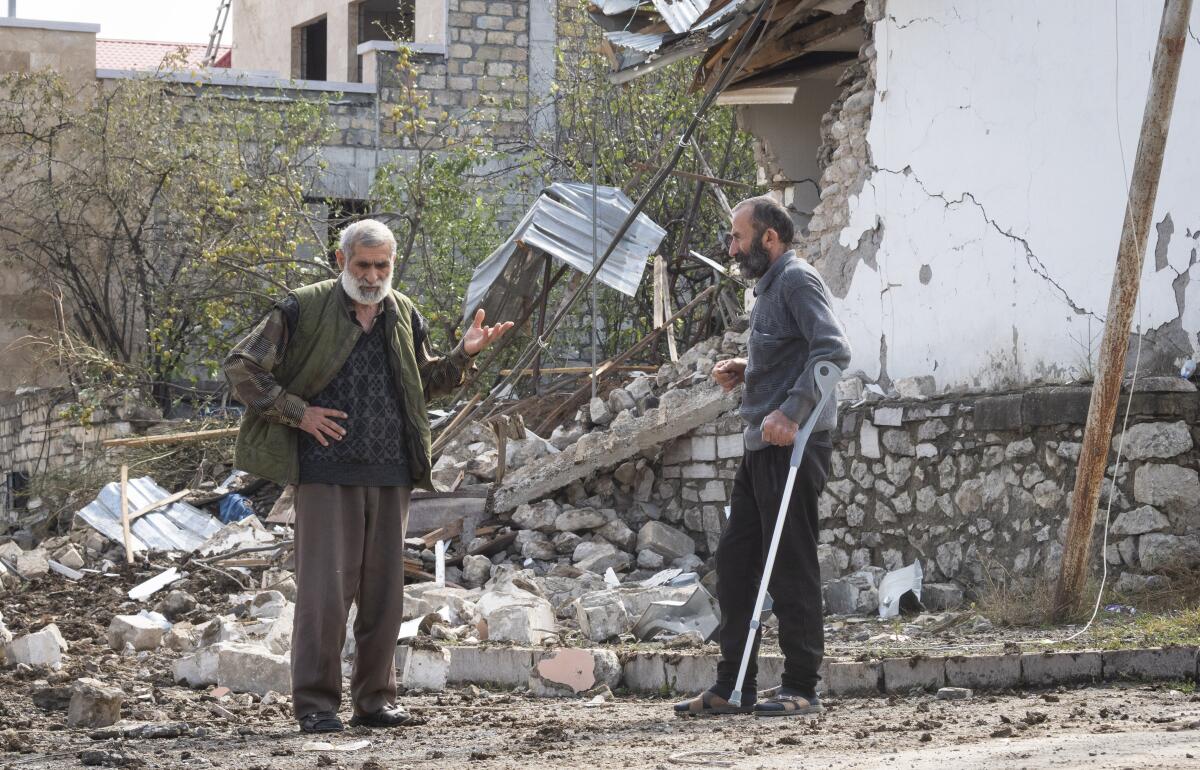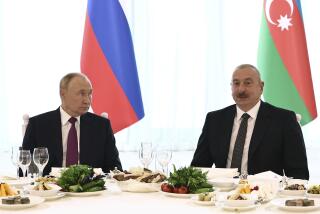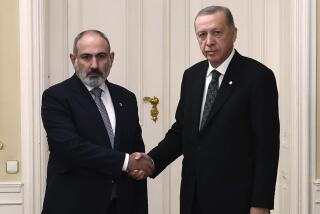Armenia and Azerbaijan agree on cease-fire in Nagorno-Karabakh

- Share via
MOSCOW — Armenia and Azerbaijan say they have agreed to a cease-fire in Nagorno-Karbakh starting at noon Saturday.
The two countries’ foreign ministers said in a statement that the truce is intended to exchange prisoners and recover the dead, adding that specific details will be agreed on later.
The announcement follows 10 hours of talks in Moscow sponsored by Russian Foreign Minister Sergey Lavrov, who read the statement. It stipulated that the cease-fire should pave way for talks on settling the conflict.
The latest outburst of fighting between Azerbaijani and Armenian forces began Sept. 27 and left hundreds of people dead in the biggest escalation of the decades-old conflict over Nagorno-Karabakh. The region lies in Azerbaijan but has been under control of ethnic Armenian forces backed by Armenia since the end of a separatist war in 1994.
The talks between the foreign ministers of Armenia and Azerbaijan were held on invitation from Russian President Vladimir Putin, who brokered the cease-fire in a series of calls with President Ilham Aliyev of Azerbaijan and Armenian Prime Minister Nikol Pashinian.
Armenia said it was open to a cease-fire, while Azerbaijan previously had made a potential truce conditional on the Armenian forces’ withdrawal from Nagorno-Karabakh, arguing that the failure of international efforts to negotiate a settlement left it no other choice but to try to reclaim the territory by force.
Speaking in an address to the nation Friday, the Azerbaijani president said that nearly three decades of international talks “haven’t yielded an inch of progress, we haven’t been given back an inch of the occupied lands.”
“Mediators and leaders of some international organizations have stated that there is no military solution to the conflict,” Aliyev said. “I have disagreed with the thesis, and I have been right. The conflict is now being settled by military means, and political means will come next.”
If the cease-fire holds, it would mark a major diplomatic coup for Russia. Moscow has co-sponsored peace talks on Nagorno-Karabakh together with the United States and France as co-chairs of the so-called Minsk Group, which is working under the auspices of the Organization for Security and Cooperation in Europe.
The current escalation also marked the first time that Turkey, Azerbaijan’s ally, took a high profile in the conflict, offering a strong political political support. In the past, Turkey provided Azerbaijan with state-of-the-art weapons, including drones and rocket systems that helped the Azerbaijani military outgun the Nagorno-Karabakh separatist forces.
Some Armenian Americans in Southern California have traveled thousands of miles to help in the war effort against Azerbaijan.
Armenian officials say Turkey is involved in the conflict and is sending Syrian mercenaries to fight on Azerbaijan’s side. Turkey has denied deploying combatants to the region, but a Syrian war monitor and three Syria-based opposition activists have confirmed that Turkey has sent hundreds of Syrian opposition fighters to fight in Nagorno-Karabakh.
Turkey’s involvement in the conflict raised painful memories of genocide in Armenia, where an estimated 1.5 million died in massacres, deportations and forced marches that began in 1915 as Ottoman officials worried that the Christian Armenians would side with Russia, its enemy in World War I.
Turkey denies that the deaths constituted genocide, saying the toll has been inflated and that those killed were victims of civil war and unrest.
Turkey’s active involvement in the conflict worried Russia, which has a military base in Armenia. The two countries are linked by a security treaty obliging Moscow to offer support to its ally if it comes under aggression.
At the same time, Russia has sought to maintain strong economic and political ties with oil-rich Azerbaijan and ward off Turkey’s attempt to increase its influence in the South Caucasus without ruining its delicate relations with Ankara.
Putin and Turkish President Recep Tayyip Erdogan have negotiated a series of deals to coordinate their conflicting interests in Syria and Libya and expanded their economic ties. Last year, NATO member Turkey took the delivery of the Russian S-400 air defense missiles, a move that angered Washington.
A cease-fire in Nagorno-Karabakh would allow the Kremlin to stem Turkey’s bid to expand its clout in Russia’s backyard without ruining its strategic relationship with Ankara.
While Turkey has aspired to join the Minsk Group talks as a co-chair, the statement issued by Armenia and Azerbaijan contained their pledge to maintain the current format of the peace talks.
More to Read
Sign up for Essential California
The most important California stories and recommendations in your inbox every morning.
You may occasionally receive promotional content from the Los Angeles Times.










